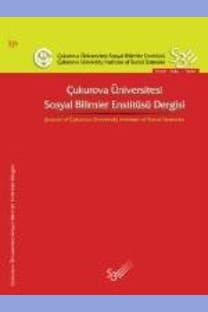Değişen Ve Popülerleşen Bir Kavram Olarak Avrupalılaşma
Avrupalılaşma, Avrupa Birliği, Orta ve Doğu Avrupa Genişlemesi
Değişen Ve Popülerleşen Bir Kavram Olarak Avrupalılaşma
___
- Agh, A. (1998). The Politics of Central Europe, London: Sage. Aron, R. (1974). “Is Multinational Citizenship Possible?”. Social Research. 4 (41): 638- 56.
- Aron, R. (1976). “The Crisis of the European Idea”. Government and Opposition, 11 (1): 5-19.
- Bideleux, R. (2001). “‘Europeanisation’ and the Limits To Democratisation In East- Central Europe”. G. Pridham and A. Agh (eds.), Prospects For Democratic Consolidation In East-Central Europe, Manchester: Manchester University Press, 25- 54.
- Bempt, P., Theelen, G. (1996). From Europe Agreements to Accession: Integration of the Central and Eastern European Countries to the European Union. Brussels: European Interuniversity Press.
- Bryant, C. (1994) “Economic Utopianism and Sociological Realism: Strategies for Transformation in East-Central Europe”. C. Bryant ve E. Mokrzycki (eds.), The New Great Transformation?, London: Routledge, 58-78.
- Delanty, G. (2000). “Social Integration and Europeanization: The Myth of Cultural Cohesion”. Yearbook of European Studies, 14, 221-238.
- Dermot, K. (1989). Ireland and the Challenge of European Integration, Cork: Hibernian University Press.
- Emerson, M. (1998). Redrawing the Map of Europe. London: Macmillan.
- Featherstone, K. (2003). “In the Name of Europe”. K. Featherstone ve C. M. Radaelli (eds.), The Politics of Europeanization, Oxford: Oxford University Pres, 3-26.
- Featherstone, K., Radaelli, C. M. (2003). “A Conversant Research Agenda”, K. Featherstone ve C. M. Radaelli (eds.), The Politics of Europeanization. Oxford: Oxford University Press, 331-341.
- Grabbe, G. (2003). “Europeanization Goes East: Power and Uncertainty in the EU Accession Process”. K. Featherstone ve C. M. Radaelli (eds.), The Politics of Europeanization, Oxford: Oxford University Press, 303-327.
- Johnson, S., Loveman, G. (1995). Starting Over in Eastern Europe: Entrepreneurship and Economic Renewal, Massachusetts: Harvard Business School Press.
- Ladrech, R. (1994). “Europeanization of Domestic Politics and Institutions: The Case of France”. Journal of Common Market Studies. 32 (1): 69-88
- Lawton, T. C. (1999). “Governing the Skies: Conditions for the Europeanisation of Airline Policy”. Journal of Public Policy. 19 (1): 91-112
- Padgett, S., Paterson, W. E., Smith, G. (2003). Developments in German Politics 3. New York: Palgrave Macmillan., 161-183.
- Papcke, S. (1992). “Who Needs European Identity and What Could It Be?”. Brian Nelson et al (eds.), The Idea of Europe, Oxford: Berg, 61-75.
- Pridham, G., (1999). “The European Union, Democratic Conditionality and Transnational Party Linkages: the Case of Eastern Europe”. J. Grugel (ed.), Democracy without Borders. London: Routledge, s. 59-76.
- Radaelli, C. (2001). “Conceptualising Europeanisation: Theories, Methods and the Challenge of Empirical Research”, http://www.york.ac.uk/depts/poli/juc/2001/papers (18 Kasım 2003), 2.
- Risse, T., Caporaso, J., Cowles, M. G., (2001). “Europeanizaton and Domestic Change: Introduction”. M. G. Cowles et al. (eds), Transforming Europe, Cornell: Cornell University Press, 1-21.
- Schimmelfenning, F., Sedelmeier, U. (2005). The Europeanization of Central and Eastern Europe, London: Cornell University Pres.
- Sedelmeier, U. Constructing the Path to Eastern Enlargement, Manchester: Manchester University Press.
- Taylor, P. (1983). The Limits of European Integration, Kent: Croom Helm Ltd.
- Young, S. Z. (1973). Terms of Entry: Britain’s Negotiations with the European Community 1970-72, London: Heinemann.
- ISSN: 1304-8880
- Yayın Aralığı: Yılda 2 Sayı
- Başlangıç: 2013
- Yayıncı: Çukurova Üniversitesi Sosyal Bilimler Enstitüsü Dergisi
Pazarlamada Yeni Yaklaşım: Nöropazarlama Üzerine Kuramsal Bir Değerlendirme
ilköğretim ikinci Kademe Türkçe Dersi Yazılı Sınav Sorularının Düzeyleri Üzerine Bir Değerlendirme
Doç. Dr. Hüseyin GÜFTÂ, Arş. Gör. Kemal Zeki ZORBAZ
ÇAĞDAŞ SOSYAL BİLGİLER ANLAYIŞI IŞIĞINDA YENİ SOSYAL BİLGİLER PROGRAMININ DEĞERLENDİRİLMESİ
Arş. Gör. Fatih ERHAN, Yrd. Doç. Dr. K. Serdar GİRGİNER, Prof. Dr. Oğuz TEKİN
Türkiye Türkçesinde a Ve –a Ekli Zarflar Üzerine
Yrd. Doç. Dr. Muna Yüceol ÖZEZEN
Yrd. Doç. Dr. Kemal Can KILIÇ, Dr. İ. Efe EFEOĞLU, Arş. Gör. Hande MİMAROĞLU, Prof. Dr. Hüseyin ÖZGEN
The Time Use Of Turkish Academics
Lise 3. sınıf öğrencilerinin arkadaşlık ilişkilerinin bazı değişkenlere göre incelenmesi
Gülşen ÇEVİK BÜYÜKŞAHİN, Meral ATICI
